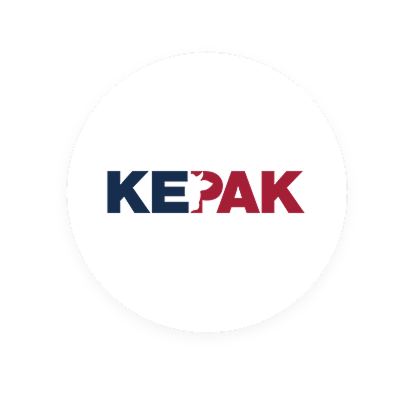14 Production Sites connected
5 Systems Fully Integrated
6 Internal Staff Trained on the Platform
Improving scalability, efficiency, and real-time decision-making
Kepak, headquartered in Ireland, is one of Europe’s leading food companies. It has 14 manufacturing sites across the UK and Ireland and owns several well-known meat brands, such as Big Al’s, Rustlers, and John Stone Beef. Kepak caters to international markets, restaurants, and households, and employs more than 4,500 people.
To keep operations running smoothly, Kepak needs joined-up systems, real-time visibility, and efficient workflows. Previously, it relied on point-to-point integrations to achieve this but lacked central control over them. This was difficult to monitor and manage, and as part of its digital transformation strategy, Kepak decided to modernize its IT infrastructure to increase scalability and efficiency and improve real-time decision-making across its sites.
In particular, it wanted to connect the three systems behind sales orders, dispatches, POs, and receipts to streamline manufacturing operations and send invoices within 48 hours.
Embracing APIs, automation, and data synchronization
Kepak decided to adopt an enterprise integration platform, and defined three objectives for the implementation:
- Adopting an API-led approach, with reusable APIs to accelerate development, reduce redundancy, and increase agility.
- Automating critical processes to streamline operations and reduce manual interventions.
- Synchronizing master data, such as product information and order details, across platforms to maintain accuracy and integrity.
Connecting the three critical systems behind production
Kepak implemented the MuleSoft Anypoint Platform with a phased migration to minimize disruption to services, and with that, met its objectives of API-led connectivity, process automation, and data synchronization. APIs can now be reused for multiple processes, acting as building blocks to simplify and speed up development while eliminating duplicated effort.
Critical systems such as the ERP, Microsoft Dynamics 365, and Emydex & SI – the manufacturing execution systems (MES) – were integrated to streamline and automate everyday workflows while enabling data synchronization between systems. Kepak used pre-built MuleSoft Connectors from the Anypoint Exchange, which makes it easier to connect applications. For example, the MuleSoft Dynamics 365 Connector, which simplifies integration with the Microsoft Dynamics 365 Cloud API.
Accelerating delivery with MuleSoft Professional Services
Kepak worked with MuleSoft Professional Services to complement the small in-house team. Together, they worked to integrate critical systems under tight timelines. The MuleSoft team provided support around architecture, process design, development, and implementation.
“MuleSoft Professional Services were excellent, both in terms of the support they provided and the handover to our team. Having a Slack channel for quick questions was really helpful,” says Liam Phillips, Software Development Manager at Kepak. “We learned a lot from the team, and they helped us to upskill.”
In fact, during vendor selection, MuleSoft Professional Services was a key differentiator for Kepak. Throughout the engagement, the team provided hands-on workshops and helped to streamline onboarding with step-by-step guidance using real-world examples. Kepak also supplemented this support with free Trailhead learning resources.
“Reinventing partner connectivity with Anypoint Partner Manager”
In parallel with the ERP to MES integration, Kepak decided to modernize its electronic data interchange (EDI) capabilities. “Due to the nature of the application and limited in-house knowledge, it was hard to get things done quickly on our old EDI system,” recalls Phillips. “We had no defined onboarding process for EDI customers and no central visibility for tracking.
The team replaced the end-of-life legacy system with Anypoint Partner Manager, which enables support for EDI formats such as EDIFACT, Tradacoms, and HTTP-based partner interactions. This is tightly integrated with the MuleSoft CloudHub platform, where Kepak APIs are hosted, and is expected to significantly enhance operational efficiency and resiliency across supply chain operations.
With Anypoint Partner Manager, issues with onboarding are a thing of the past. The solution has a user-friendly interface and captures all the relevant data up front. It provides visibility of payloads, streamlines message flows, and information can be retransmitted to the backend system at the click of a button. This addresses a pain point with troubleshooting, which previously required staff to manually reach out to the customer and ask them to resend their order.
Transforming pork production with synchronized data
During the pork manufacturing process, Kepak was using Excel spreadsheets with Visual Basic for Applications (VBA) automation to manage the process from livestock intake to up to entry to the boning hall area. However, there were some issues around data accuracy and security patch updates were causing application downtime. Tasks were siloed across multiple systems, and there was a risk of data loss, human error, corrupted files, and latency.
With MuleSoft as the central integration layer, Kepak connected systems and built a web-based front-end to take users through every step of processing from one screen. Data flows between three critical systems to provide real-time traceability and to support payments to the farmers who supply the livestock.
Looking to the future: pioneering smarter sustainability initiatives
Looking ahead, Kepak is planning on extending the value of MuleSoft to its sustainability programs. With full visibility into production, logistics, energy use, and supplier sourcing, Kepak plans to automate ESG reporting and drive measurable carbon, water, and energy reductions across all 14 manufacturing sites in Ireland and the UK.
By integrating procurement systems with supplier ethical and sustainability scoring platforms, MuleSoft will also empower Kepak to make better-informed sourcing decisions. This real-time ESG intelligence will strengthen Kepak’s leadership position as a responsible, future-ready food processor.
“Implementing MuleSoft with its API-first design is a more sustainable approach in itself,” adds Phillips. “We can create modular, reusable services that reduce redundant or duplicated effort, lower compute resource usage, and promote greener IT practices.”
Enhancing operational efficiency across production
Since implementing MuleSoft, Kepak has enhanced operational efficiency and improved data flow and accuracy across the business. It also has a flexible integration framework that will grow in line with its business, and with more agile development, can rapidly deploy new services in line with changing market needs.
Kepak’s in-house team also has the skills to manage and change the platform themselves, which will deliver significant cost savings.
“Being self-sufficient is a major benefit. Not just in terms of costs, but because we’re not reliant on third parties and their schedules. If we need something done quickly, we have the resources to deliver it ourselves,” adds Phillips.
MuleSoft also acts as an enabler and is helping Kepak to position itself as a leader in the sustainability space, evolving beyond operational excellence towards a measurable reduction in its environmental impact.





